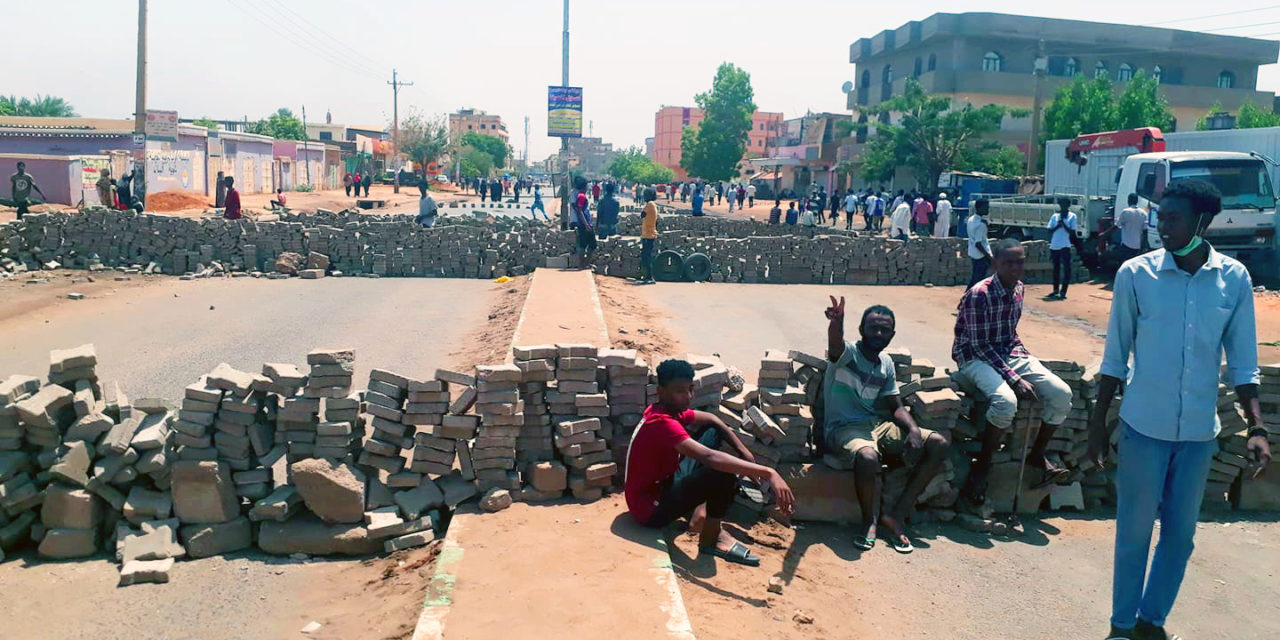Protestors are blocking a road in Sudan’s capital Khartoum. (cc) AlAdwaa. Online | Mohamed Ibrahim | June 3, 2019
Many protestors in Sudan experienced intense fear, horror and helplessness in response to scenes during which people suffered serious injury or death. Some go on to lead relatively normal lives. But on others, these traumatic experiences take their toll.
During last year’s uprising in Sudan, security forces often used brutal violence to suppress the protestors. In the worst such case, dozens of people were killed – and some had their bodies thrown into the River Nile – in a crackdown on protesters in the capital, Khartoum on June 3, 2019.
According to the Central Committee of Sudan Doctors (CCSD), on that day paramilitaries moved in to disperse a peaceful protest sit-in in front of the Army General Command in the centre of Khartoum and killed 127 people, injured hundreds and, up to today, dozens of people are still missing.
This and other terrifying events caused severe trauma among many of the protestors who survived. Dr Ali Baldo, a Psychiatrist, Neurologist and Mental Health Professor, calls this the “sit-in dispersal syndrome”. In an interview with the AlAdwaa.Online, he said that “the syndrome is one of the post-traumatic stress disorders caused by the horrors of the June 3, events”.
The syndrome, according to Dr Baldo, may include flashbacks, nightmares and severe anxiety, as well as uncontrollable thoughts about the event. It may further cause acute abdominal pain, headache, nausea, vomiting, convulsions, fainting, loss of weight, memory loss and confusion.
“The syndrome is one of the post-traumatic stress disorders caused by the horrors of the June 3, events.”
Dr Ali Baldo
According to Dr Baldo, these are not the only implications. “There are other serious psychological complications such as self-blame, the inability to provide help to others, inferiority and sensitivity, leading to acute depression as a result of powerless feelings, especially among those who have experienced sexual harassment or rape.”
Dr Mohamed Salah al-Fahl, psychiatrist and a founding member of the Reach Out initiative, says that “those who suffered the sit-in dispersal syndrome are many, but very few of them received psychological support”. He stressed that “women who were raped had suffered terrible violence and details were not published given the sensitivity of this issue.” He also said that “most of the persons attempting suicide are women who were raped”.
The Reach Out initiative
Amidst growing concern for the traumatised protestors, the Reach Out initiative was launched, providing psychological care for the survivors of the General Command massacre and other violent incidences. The initiative is supervised by the Central Committee of Sudan Doctors (CCSD), which is part of the Sudanese Professionals Association (SPA).
Dr al-Fahl explained to AlAdwaa.Online that the initiative came as a result of the General Command massacre, when the CCSD was contacted by activists and supporters of the Neighbourhood Resistance Committees, reporting survivors who suffer from behavioural disorders.
Dr al-Fahl describes the case of M. A.: “One of M. A.’s friends reported his case to the initiative,” adding that he was found homeless in one of the Bahri city neighbourhoods two weeks after the massacre.
M. A. survived the June 3 massacre, but his life has changed drastically since that day, according to Dr al-Fahl. M. A. feels guilty to have survived the massacre while his colleagues and friends died in front of his eyes. Some were burnt, others were shot, and many were beaten to death or raped.
While protests were still ongoing, Reach Out formed three field teams, composed of doctors and psychotherapists, assigning one team to the capital Khartoum, one to Omdurman and another one to Bahri. Upon receiving reports of people in need, the field teams then responded, providing psychological and medical services.
The initiative’s Facebook page has become the primary place for reporting cases and coordinating with victims and partners such as the Resistance Committee to raise awareness among people of possible psychological disorders among their family relatives, friends and neighbours.
By now the initiative has created three centres to follow up on survivors and provide psychological services: the Fanar centre, near the Qurayshi Gardens in Khartoum, which opens every Saturday and Wednesday; a centre in Omdurman, which opens every day, in coordination with the Ahfad University for Psychological Counseling; and a new centre in Bahri, in the Najat Philanthropy Center, which opens every Tuesday and Saturday.
These services are crucial, as hospitals providing psychological counselling and treatment for the affected people are few in Sudan – except for the Taha Bashar Psychiatric Hospital in Bahri, and al-Tajani al-Mahy Hospital in Omdurman.
However, many avoid going to these hospitals, in fear of security organs. Dr al-Fahl says he has heard of attempts by security organs to silence survivors of the June 3 tragedy admitted in government hospitals. “They are trying to financially lure them not to say that they were victims of the dispersing of the sit-in.”
Reach Out also collaborates with other partners in the “Missing” campaign. The SPA launched the campaign to search for the missing survivors of the General Command massacre. The campaign further aims to provide medical support for found missing persons and legal support for their families.
Dr Musab Ajab, working for the “Missing” campaign, told AlAdwaa.Online that 48 missing men and women were found and most of them in the capital Khartoum. He added that five of them were found dead according to a statement issued by the campaign.
Dr Ajab explained that after finding missing persons, the campaign provides necessary physical, psychological and medical services through the Reach Out initiative and then it provides legal services through the Democratic Lawyers Alliance. “The campaign focuses more on popular efforts, especially because the police is not sufficiently cooperating with us in this matter,” said Dr Ajab.
A long healing process
Dr Baldo stressed the necessity to provide the survivors of the massacre with free treatment inside and outside of Sudan, as well as to provide them with adequate opportunities to recover from what they have experienced.
Although the efforts undertaken so far are an essential step towards healing, more needs to be done. Dr Baldo says perpetrators, who caused the massacre, have to be brought to justice – “seeing justice is considered a key part of recovery”.
“Justice prevents us from entering into the world of revenge, violence and counter-violence. And from forming special groups to obtain rights through violence and the implementation of the jungle law using armed action or even military rebellion,” Dr Baldo says.
Dr Baldo added that “it is the duty of the transitional government to make the opening of the file by the inquiry commission a priority and to bring perpetrators to justice through independent and highly transparent court proceedings”.
He concluded: “We should not forget that the entire Sudanese people were shocked by what they have heard or seen. Therefore, all the people suffer from this syndrome [the sit-in dispersal syndrome], and we can say that this syndrome has afflicted every zealous and revolutionary male and female Sudanese.”
“We should not forget that the entire Sudanese people were shocked by what they have heard or seen.”
Dr Ali Baldo

